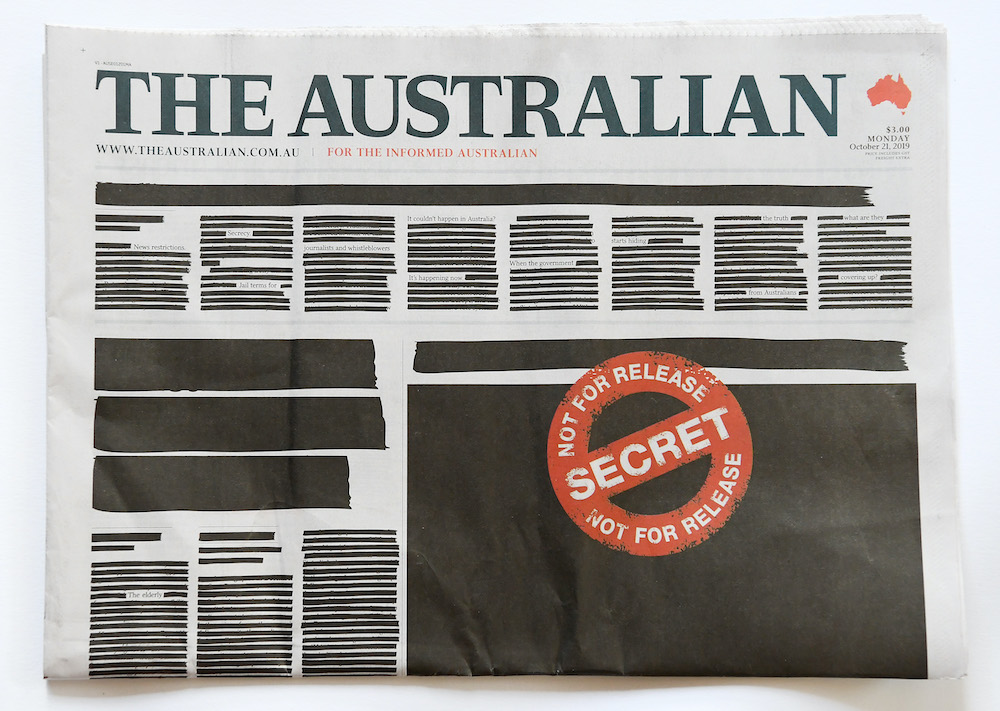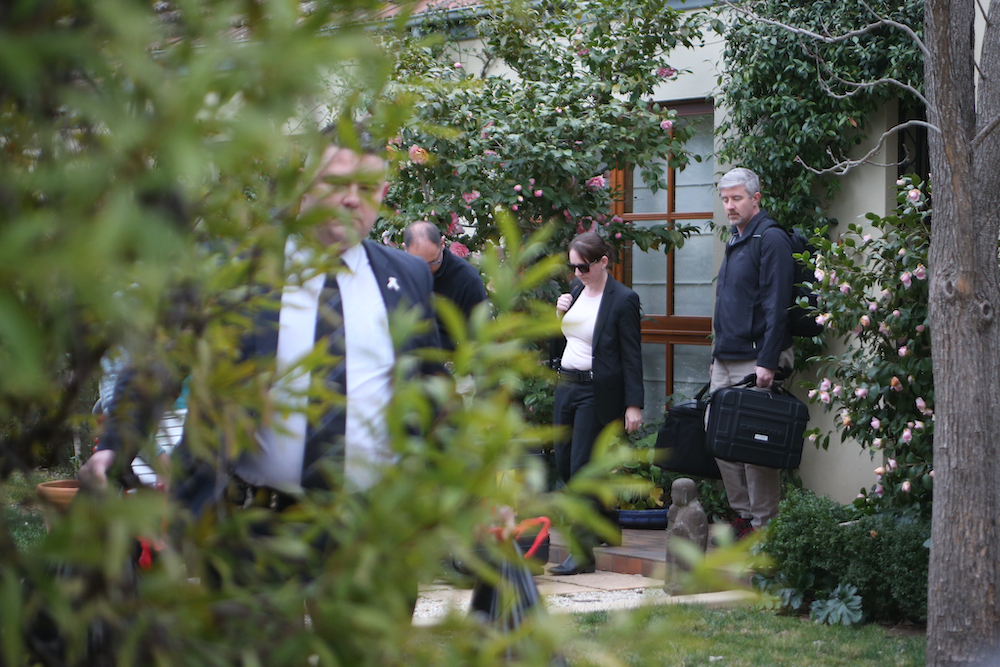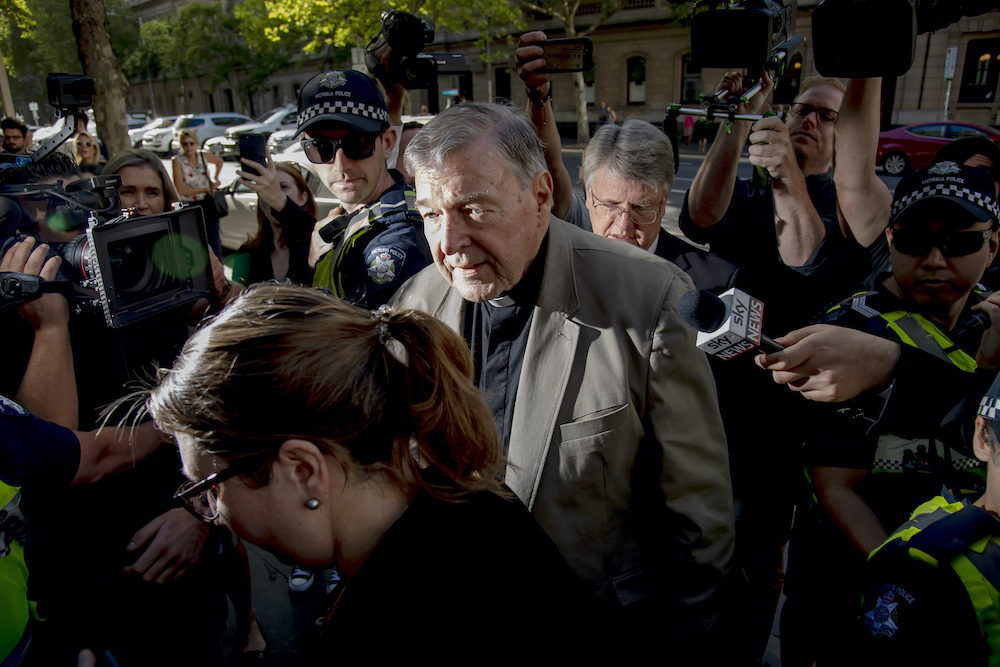
The Australian newspaper is seen on October 21, 2019 in Melbourne, Australia. Media outlets across the country ran blacked-out front pages as part of a campaign calling for reforms to protect public interest journalism in Australia
“In the flowers there was a note that said, ‘There are four sets of eyes on you.’” he recalls. “What they were saying was that there were four security agencies who were surveilling me or my sources. The person who sent them to me knew about this investigation, and they were kind enough to let me know so I could take pre-emptive measures.”
Media freedom in Australia faces an increasingly gloomy future
McKenzie is one of Australia’s most-lauded investigative journalists. He has won the Walkley, Australia’s equivalent of the Pulitzer, eight times. His stories have included investigations into Chinese influence on Australian politicians and corruption involving Chinese “high rollers” visiting Crown casinos. He has reported on the Italian mafia in Australia, money laundering, and bribery by Australian government agencies selling their services overseas. Most recently and controversially, with veteran Australian investigative journalist Chris Masters, he reported on war crimes allegations, including allegations of six unlawful killings, against Ben Roberts-Smith, a highly decorated soldier who served in Afghanistan and one of Australia’s most respected public figures. The former soldier sued for defamation and asked the courts to force the identification of the journalists’ source so that person, too, could be sued. Earlier this year, the judge ruled to protect their sources.
McKenzie says his journalism has been compromised by the increasing difficulty of protecting his sources. He instructs them never to contact him using his cell phone or office email. He uses unidentifiable “burner” phones, leaves electronic devices behind when he goes to meetings, and tries to meet with sources in those increasingly few locations without security cameras.
Media freedom in Australia faces an increasingly gloomy future. In the past year, the country dropped five rankings to number 26 on the 2020 World Press Freedom Index from Reporters Without Borders; the change was among the five biggest single-year declines, alongside nations such as Singapore, Benin, and Djibouti. Australia offers the world a sobering example of how a liberal democracy can incrementally surrender media freedom – and how hard it can be to fight back when the public is increasingly disengaged and distrusting of media. Unlike the U.S., the Australian Constitution contains no Bill of Rights and no explicit guarantees of individual freedoms, including freedom of expression. Australia was formed not after a war of independence, but as a coming together of colonies, most of them former prison settlements, with the first newspapers published by government. The Constitution addresses taxation powers and states’ rights, not the rights of the people. This legacy, together with the fears and crises of our own time, has made media freedom particularly vulnerable.
For decades, Australia’s defamation laws have made it relatively easy to bring and win a suit. Contempt of court laws routinely privilege the smooth administration of justice over the public’s right to know – most notoriously in the recent case of Catholic Cardinal George Pell, whose conviction in 2018 on child sex offenses was published in the world media, but suppressed in Australia by a court order. Multiple journalists are now facing criminal charges for publishing protests about the restrictions.
In recent years, a succession of laws aimed at border security and the fight against terrorism have inhibited journalists’ ability to report on the exercise of government power. Laws prohibit disclosures on intelligence operations and aspects of border security, including the treatment of refugees seeking asylum. In addition, law enforcement agencies can probe the identity of journalists’ confidential sources, accessing phone records and electronic data. All of this makes it more difficult for journalists to get information to the public.
Meanwhile, McKenzie says he spends at least a day each week dealing with actual or threatened litigation, mainly defamation. Decisions to publish important stories that may lead to costly lawsuits are harder these days as the Australian media, like most outlets in the West, face declining advertising revenue.
The fact that Australia is a liberal democracy in some ways obscures the nature of the problem. The world’s attention tends to focus on countries such as Hungary, which is being consciously reshaped into an illiberal democracy – an effort aided by the fact that 90 percent of Hungarian media is controlled by a handful of allies of Prime Minister Viktor Orbán. Despite a reputation for instability in the top job (having had five prime ministers since 2013), Australia has courts that are independent and a press that pursues public interest reporting even when it leads to conflict with the government.
But Hungary and Australia share some similarities, such as a national obsession with migrants and the framing of refugee arrivals as a violation of sovereignty. In Australia, the arrival of “boat people” has resulted in a militarization of the northern ocean borders and declining access for the press. The government refuses to provide information on the military interception of boats carrying refugees and Australian journalists are routinely denied access to the squalid refugee detention centers in Papua New Guinea and Nauru. The Department of Home Affairs recently lost a three-year battle to prevent the release under freedom of information legislation of documents relating to the operation of the detention camps.

Australian police execute a search warrant on the home of an intelligence officer in Canberra in September 2019, a raid related to a prior one on journalist Annika Smethurst’s home over a story she wrote about the Australian Signals Directorate
Australia is also like Hungary in the concentration of media ownership. Roughly 80 percent of newspaper circulation is in the hands of Rupert Murdoch’s News Corp, seen by many commentators as close to the current conservative Coalition government, Robert Manne, professor of politics at La Trobe University, who has analyzed the Murdoch press’s coverage of recent electoral contests, describes Murdoch as having honed his Australian papers into “a single political instrument” equal in political influence to Murdoch’s Fox News in the U.S., and responsible for hobbling mainstream debate on climate change, among other issues. Murdoch also controls the cable news channel Sky News, and with co-owners, the wire agency Australian Associated Press.
The issue of press freedom last year made it on to the front pages of the nation’s newspapers, when the Australian Federal Police raided the home of News Corp journalist Annika Smethurst and the offices of the national public broadcaster, the Australian Broadcasting Corporation (ABC). The ABC raid was a search for the sources on a series of reports alleging that Australian soldiers killed unarmed men and children in Afghanistan. Smethurst had reported that the Australian Signals Directorate – a security agency charged with eavesdropping on security threats outside the country – was pushing for permission to monitor the web activity of Australian citizens. The government strongly denied Smethurst’s story when it was published, but the agency’s director general this year told a Senate committee that Australians had been spied on in the past year and it had indeed sought more powers.
Both media organizations have challenged the validity of the raids in the courts to mixed success. The ABC argued unsuccessfully to the Federal Court of Australia that the police should be forced to return the 124 documents they had seized. The High Court unanimously decided in April that the warrant used to search Smethurst’s home was invalid, but stopped short of forcing police to return or destroy the material it gathered. Charges may yet be filed against Smethurst and ABC journalists Dan Oakes and Sam Clark because they received leaked information.
This leaves Smethurst in a particularly difficult position as a political reporter under threat of being charged with offenses that could lead to jail time. “Fortunately, I haven’t been in a position where I have come across a gold story relating to the attorney general and had to decide how I report that, knowing that my freedom is in his hands,” she says.
Paul Murphy, head of the journalists’ union the Media, Entertainment and Arts Alliance, says 2019 was a particularly bad year for journalists, with the raids a reflection of the direction the country has been heading since broad anti-terrorism powers passed in the aftermath of 9/11 and the War on Terror.
At least 64 national security laws were passed between 2001 and 2014. This is a “degree of legislative activism [that] is striking compared even to the United Kingdom’s active agenda and much greater than the pace of legislation in the United States or Canada,” according to University of Toronto law professor Kent Roach, an expert on counterterrorism laws.
Roughly 80% of Australia’s newspaper circulation is in the hands of Rupert Murdoch’s News Corp
Since 2013 Australia has introduced penalties for disclosing any information about intelligence operations and given the foreign minister the power to declare parts of the world no-go zones. For a few years, during the peak of ISIS activity, it was illegal for an Australian to enter Mosul, Iraq, or Raqqa, Syria. Journalists could seek an exception under the law but only if they could prove that their sole purpose for being there was reporting. Freelancers were ineligible.
National security was also the justification for another newly created offense — of foreign interference in politics. This was used recently against Al Jazeera English, after its documentary “How to Sell a Massacre” broadcast information gained by an undercover journalist showing attempts by the right-wing Australian One Nation Party and the U.S. National Rifle Association to undermine Australia’s strict gun ownership laws. The Australian government sent Al Jazeera English, which is partly funded by the Qatari government, a warning letter over the report. No further action has been taken against Al Jazeera or the reporter, but in March the government proposed expanding intelligence agencies powers to allow suspects under this law to be forcibly detained and questioned for up to 24 hours.
In the absence of constitutional protections in Australia, the increasing powers of government have so far been restrained largely by culture and custom. Security and policing agencies have been careful about using their powers, says Rebecca Ananian-Welsh, an expert in national security law and press freedom at the University of Queensland: “We’re the only liberal democracy that allows domestic spy agencies to covertly and compulsorily detain and interrogate non-suspects. But there has never been a detention order issued and only a handful of people have ever been interrogated. The line has always been, ‘Don’t worry, you can trust us. We need these powers and we need them to be broad, but you can trust us with them.’ In some respects that trust has been borne out.”
But the June raids revealed the ways in which that trust is being put to the test against the journalists, who have not identified their sources. Whistle-blowers can still be at risk even if journalists hold fast to their ethical obligations.
Police must obtain a warrant before accessing a journalist’s metadata if identifying a source is their goal. That offers little protection, not least because there is nobody representing the media’s interests at the hearings, which happen in secret. Six journalist information warrants were granted to the federal police in the 2018-19 fiscal year, up from three the year before. Nothing is known about the subjects of those warrants, says Ananian-Welsh.
The battle over access to electronic data is international, of course – and the Australian government has learned from overseas experience. A 2018 parliamentary act was designed to pre-empt the possibility of a battle similar to that between Apple and the U.S. Federal Bureau of Investigation over unlocking encrypted data on cell phones. Australian laws require tech and telecommunications companies to give police access to encrypted information. Says Ananian-Welsh, “When the metadata retention act was first released, everyone said, ‘Right, journalists, you need to encrypt everything … These laws close that back door. Encrypting will no longer be enough.”
There is some evidence to suggest the public values a free media in principle, but at the same time surveys suggest they don’t trust media outlets
Meanwhile, journalists regularly report that sources of information are drying up. Whistle-blowers no longer believe they can be protected – and they may be right. Prosecutions against whistle-blowers are increasingly frequent. Paul Murphy of the journalists’ union says laws regarding public sector whistle-blowers are designed to punish people and discourage them from coming forward. He points to the experience of Richard Boyle, a former Australian Taxation Office employee who blew the whistle to the ABC in 2018 over the deliberate targeting by government employees of small businesses in an attempt to meet revenue targets, including through the use of powers allowing money to be seized from bank accounts. Boyle, who was named in the story, has been charged with 66 offenses and faces up to 161 years in jail. Federal Attorney General Christian Porter has made it clear he will not intervene in the prosecution and court processes.
There is a challenge to the weak protections afforded journalists in Australia — by journalists themselves, media organizations, civil rights groups, some lawmakers, and academics. Lawmakers have pushed for action in the federal parliament, including a bill for a referendum to change the constitution; raids on journalists have been challenged in the courts; and media organizations through the Right to Know coalition have sponsored a public awareness campaign that includes ads stating “Journalism Is Not a Crime.” There have been some incremental wins, but it’s hard to point to solid signs of hope.
In October last year, every major newspaper and digital outlet published redacted front pages to protest the attack on “Your Right to Know.” There were advertisements on radio and television, and rural and regional newspapers asked their local representatives, councils, and mayors to declare their support for press freedom, and published their responses. The Right to Know coalition is asking for six reforms, including for warrants against media organizations to be contestable in the courts before execution, better protections for whistle-blowers, exemptions in national security laws for journalists, and overhauls of secrecy classification, freedom of information, and defamation laws.There is some evidence to suggest the public values a free media in principle, but at the same time surveys suggest they don’t trust media outlets. The ABC is the only mainstream outlet that reliably scores well on measures of public trust. Newspapers are regarded as trustworthy by only about half the public. Television news does slightly worse. Journalists themselves rate just above used car salespeople on surveys of public perceptions of honesty.
This is against a background of increasing political disengagement: The Australian Election Study found after the 2019 election that only 17 percent of voters reported following the election through the work of professional journalists. Only one in three voters reported taking “a good deal” of interest in the election campaign, compared to half 26 years ago. All this in a country with compulsory voting.

Cardinal George Pell arrives at the County Court in Melbourne, Australia in February 2019. Australia’s contempt laws suppressed information about Pell's trial in Australian media outlets
The lack of trust in the media is not an issue for Australia alone. But the implications are more dire in Australia, given the lack of constitutional protection for journalists.
The recent raids and the modern anti-terrorism and national security legislation are alarming, but according to McKenzie the far older problem of defamation is the main challenge for journalists. Australian laws are largely based on the British system, with some toxic add-ons and cultural peculiarities. Now, with a population less than half the size of the United Kingdom, courts in Australia hear about twice as many defamation cases each year.
The plaintiff-friendly laws have been blamed for stifling public interest journalism. One of the founders of the #MeToo movement, American civil rights activist Tarana Burke, told an audience in Sydney last October that Australian defamation laws had prevented a meaningful movement emerging in Australia. “The way the laws are set up in countries like Australia do lead to women staying silent,” said Burke.
In defamation cases, plaintiffs don’t need to prove they suffered actual harm to their reputation, only that the publication could have damaged it. The so-called “actual malice” standard, under which those in the public eye must prove malice to pursue a libel case, has no equivalent in Australian law.
Truth is a defense against a defamation action, but the onus of proof is on the publisher. The publisher has to prove both the truth of the facts, and any innuendoes or implied meanings the court finds arise from the publication. According to Jason Bosland, associate professor at Melbourne Law School, this means that a minor error of fact in an article can be fatal to a truth defense, even if the thrust of the published allegation is true.
Defamation laws interact with the threat to journalists’ sources. There are limited protections, known as “shield laws,” for journalists protecting their sources before the courts, but in most states they rely on the judge’s weighing of the public interests involved.
The Australian court case that has drawn the most international attention in the last few years was that of Cardinal George Pell, who in December 2018 was found guilty of child sexual abuse. Pell, an Australian, was the third most senior Catholic in the world and the highest-ranking member of the Church to have been convicted, though his conviction was recently reversed and he was freed. His conviction made headlines around the world – but due to a court-issued suppression order his name did not appear in the Australian media until months later.
Australia’s contempt laws suppress the publication of prejudicial information while cases are before the courts. Pell was facing charges in two consecutive trials. That meant the existence of the second trial prevented the reporting of the first. The courts also ordered that a book published years earlier by the investigative journalist Louise Milligan, “Cardinal,” be removed from sale in the state until the trial was completed. Milligan was accused in court by Pell’s lawyer of trying to “[poison] the public’s mind” with her reporting.
Frustrated, the Herald Sun, a News Corp. tabloid based in Melbourne, blacked out its front page on the day after the verdict, with the word “CENSORED” running from edge to edge in bold, white type. “The world is reading a very important story that is relevant to Victorians. The Herald Sun is prevented from publishing details of this significant news. But trust us, it’s a story you deserve to read,” the paper said.
The suppression order was lifted in late February 2019, after the second case against Pell was dropped. The Herald Sun ran with “Guilty as Sin.” The same day the order was lifted, it emerged that some 100 journalists, editors, and publishers had been threatened with charges by the director of public prosecutions. Of those, about 34 are expected to stand trial in July on contempt charges for their attempts to draw attention to the fact that they were being prevented from reporting the case.
Perhaps the way forward lies in emphasizing not the rights of journalists, but the rights of the people to information
The experience of Australian journalists is instructive for the rest of the world. Even in an established liberal democracy, media freedom can be incrementally undermined. Without the constitutional protections enjoyed by journalists in the U.S., Australian journalists can’t be confident that they are protected — and this at a time when the public is increasingly disengaged and distrustful of institutions, especially the media.
Perhaps the way forward lies in emphasizing not the rights of journalists, but the rights of the people to information.
Over the spring and summer of 2019-20 Australia went through a bushfire crisis. Whole communities were cut off from the world. The sky turned red, then black. The country came to the city in the form of smoke and dust. The frontline job of reporting fell largely to junior reporters from the country towns and regions. They slept in the open with bushfire victims, and reported day after day under challenging circumstances. For weeks the nation was glued to their work. For some, it was a matter of life and death – accurate information on where the fire was, and when to evacuate. For others it was a way of understanding the tragedy, a means of building social empathy.
And it was also a way of connecting the particular to the general, fostering a discussion on the Australian government’s climate change policy, and the quality of the government’s response to the crisis.
This work – the journalistic functions of factual reporting, social empathy, and political connection – was an up-close and sustained demonstration of the importance of information. Praise for the work of the young journalists, in particular, filled social media. Here, perhaps, is some slender hope – that when and if the risk is made clear to them, the urgency of the work manifest, the citizens themselves will want to protect a free media.



